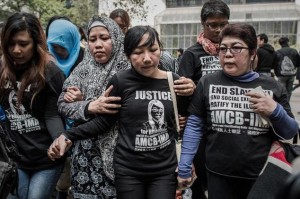Sunday Times 2
Sri Lankan domestics risk abuse in Hong Kong’s hostile households
Regardless of the risks of abuse they face, more than 480 Sri Lankan domestic helpers got visas last year to work in Hong Kong where there were 115 reported incidents of violence against domestics by their employers in the three years to 2014.
While many treat their helpers well, abuse is not uncommon, especially so against South Asians. Abuses are committed not just by Chinese but by Indians as well. Many Sri Lankans work for Indian families, some of whom do care for their domestics.

Indonesian former maid Erwiana Sulistyaningsih (centre) leaves the court of justice in Hong Kong, on February 10, 2015 ©Philippe Lopez (AFP)
Once more, Hong Kong found itself with egg on its face, when a violent, middle-aged Chinese mother of two was convicted of repeated assaults on Indonesian helper Erwiana Sulistyaningsih, 24, who suffered serious wounds and went home a wreck.
The Chinese woman, Law Wan-tung, 44, also threatened to kill the girl and her family if she reported the brutal assaults. She was convicted on 18 of 20 charges including assault and criminal intimidation. She was also ordered to settle unpaid wages of HK$28,000 (479,198 rupees).
Abuse in Hong Kong includes humiliation, not paying salaries, underpayment, intimidation, denying holidays, denying meals, and sexual, psychological, and racial abuse.
Last year there were 38 reports of violence against helpers. That amounts to three reports of assaults and wounding every month, or one incident of violence every 10 days.
Sri Lankan domestic helpers are among the most disadvantaged in Hong Kong. They have no protection from diplomats (only a weak honorary consulate in HK), nor are their legitimate rights protected by the Bureau of Foreign Employment, whose board is stacked with job agents, while ministers and chairmen have shown scant interest in their welfare and rights.
The new Foreign Employment Minister, Thalatha Athukorala, has shown great eagerness to curtail the right to migrate rather than devise mechanisms for protection of migrants. Among her first statements she has declared her intention to stop migrations of certain categories of women. Previous restrictions have been condemned by the UN Special Rapporteur on the human rights of migrants following a visit in May 2014 as a violation of the right to migrate.
And yet successive finance ministers, including Ravi Karunanayake, and the Treasury, are delighted to pocket US$6.3 billion in remittances from Sri Lankans. Sri Lankans going overseas continue to be milked by finance ministers and job agencies. They pay a heavy price to the Government and corrupt agents who illegally charge Rs. 300,000 for placement in Hong Kong. Overseas workers get nothing in return for their contributions to the economy.
Foreign exchange sent home by Sri Lankans exceeds the balance of payments surplus of US$ 1.62 billion from January to November 2014, an analysis of Central Bank data shows. Their earnings far exceed tourism receipts of US$ 1.94 billion and even surpass the value of textiles and garments exports, and compare favourably with exports of US$ 10.1 billion in Jan-Nov 2014.
Sri Lankan domestic helpers in Hong Kong are entitled to a minimum wage of HK$ 4,100 (Rs. 70,241) since October 2013, according to Immigration Department regulations. In addition, they are eligible for free food, or an allowance in lieu of HK$ 920 (Rs. 15,745) a month. It is negligible in this city of luxury prices where a 100 gram instant cup noodles pack costs the equivalent of Rs. 120 and a curry puff costs the equivalent of Rs. 150.
Hong Kong’s legislative council was told on Wednesday during question time that 488 Sri Lankan domestic helpers were granted visas in 2014. But it is unclear if they were new arrivals, replacements for those who left, or renewals of existing contracts. In 2103, 565 helpers took up jobs. And in 2012, the number of Sri Lankans domestics allowed visas was 544.
In the three years to 2014, that adds up to 1,597 Sri Lankans granted papers in Hong Kong.
These figures were presented to lawmakers by Hong Kong’s labour minister in response to a question by a leading female legislator, who raised concerns about abuse of domestic helpers in the wake of this week’s conviction of the Chinese housewife.
Overall last year 95,060 domestic helpers got visas to Hong Kong. Majority were from the Philippines (49,029 helpers) and Indonesia (42,915). Thais, Sri Lankans, Indians, and others made up the remainder of the total.
In the past three years, police in Hong Kong recorded 115 reports of wounding and serious assault of domestic helpers, the labour minister told lawmakers. In 2014 alone, there were 38 reports of wounding and serious assault by employers.
It is not known whether the 38 reports cited included complaints by Sri Lankans who had faced violence by employers. There are instances when Chinese employers in Hong Kong have wounded Sri Lankan domestics and even of an instance when a neurotic, abusive Chinese woman threw out a Sri Lankan mother onto the street near midnight on a wintry day. She was denied meals.
Compared with the more than 300,000 foreign helpers in Hong Kong, 38 instances of violence do not seem much. But data masks reality. Many abused helpers do not report to police convinced that they are biased and will not investigate or act on their findings. Helpers also will not report for fear of facing hostility from employers and losing their jobs.
While he presented police reports figures, the labour minister would not say how many offenders had been prosecuted and sentenced, saying that Hong Kong Government “does not maintain statistics on the relevant sentencing outcome”.
His comments were seen as a subtle attempt to protect the much-maligned Hong Kong Police, whose perceived reputation as ‘Asia’s finest,’ took a beating during last year’s protests. The minister could have provided, or at least attempted to provide, details of prosecutions and outcomes from the Department of Justice.

